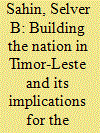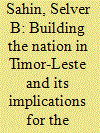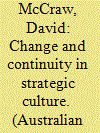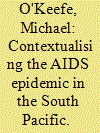|
|
|
Sort Order |
|
|
|
Items / Page
|
|
|
|
|
|
|
| Srl | Item |
| 1 |
ID:
103588


|
|
|
|
|
| Publication |
2011.
|
| Summary/Abstract |
This article examines the results of the world's largest ever survey of international relations (IR) scholars with an eye to establishing the particularities of the discipline in Australia and New Zealand. The survey covered the areas of teaching, research, the structure of the profession and scholars' views on foreign policy. From these results, this paper compares IR in New Zealand and Australia, and discusses the extent to which the discipline in these two countries is distinctive from its overseas counterparts, especially in the United States and the United Kingdom. The particular areas of focus include the degree to which the field in Australasia conforms to or differs from US or Commonwealth identities; epistemological and gender divides; the distinctive foci of what IR scholars in both countries teach and research; which publications are favoured and disfavoured; and the contrasting linkages between academia and the world of government and policy. We conclude with some suggestions about how the field in both countries might be improved.
|
|
|
|
|
|
|
|
|
|
|
|
|
|
|
|
| 2 |
ID:
103592


|
|
|
|
|
| Publication |
2011.
|
| Summary/Abstract |
This article contributes to the discussion of the international democratisation of the so-called 'post-conflict' or 'fragile' countries by addressing one of the most important but least studied issues in the literature-the relationship between democracy and nation-building. It does so by analysing the major socio-political aspects of the democratic nation-state-building process in Timor-Leste in the post-1999 period. It argues that contemporary international democratisation policies and practices prioritise the 'stateness' problem, conceptualised by reference to a set of organisational, procedural and functional concerns. Little attention is, however, paid to the 'nationness' question. As the experience in Timor-Leste indicates, it is the national ideas that determine the structural and operational parameters of democratisation, which is, after all, a process of socio-political transformation by which political power and wealth are redistributed amongst a variety of competing societal interests.
|
|
|
|
|
|
|
|
|
|
|
|
|
|
|
|
| 3 |
ID:
103593


|
|
|
|
|
| Publication |
2011.
|
| Summary/Abstract |
This article contributes to the discussion of the international democratisation of the so-called 'post-conflict' or 'fragile' countries by addressing one of the most important but least studied issues in the literature-the relationship between democracy and nation-building. It does so by analysing the major socio-political aspects of the democratic nation-state-building process in Timor-Leste in the post-1999 period. It argues that contemporary international democratisation policies and practices prioritise the 'stateness' problem, conceptualised by reference to a set of organisational, procedural and functional concerns. Little attention is, however, paid to the 'nationness' question. As the experience in Timor-Leste indicates, it is the national ideas that determine the structural and operational parameters of democratisation, which is, after all, a process of socio-political transformation by which political power and wealth are redistributed amongst a variety of competing societal interests.
|
|
|
|
|
|
|
|
|
|
|
|
|
|
|
|
| 4 |
ID:
103589


|
|
|
|
|
| Publication |
2011.
|
| Summary/Abstract |
The relationship between strategic culture and defence policies has not yet been much explored. Australia and New Zealand provide some evidence of the impact of strategic culture on defence policy. Australia has a dominant strategic culture which is strong enough to prompt both the major political parties to adopt realist defence policies, even though Labor has a traditionally 'idealist' outlook. Until the 1970s, New Zealand had a similar dominant strategic culture which influenced both major political parties, but it was always less strong than Australia's. In recent years, the Labour Party has rejected that culture, and allowed an alternative strategic culture based on its ideology to influence its defence policies. The result has been that on the last two occasions when Labour has been in government, New Zealand's defence policy has changed dramatically.
|
|
|
|
|
|
|
|
|
|
|
|
|
|
|
|
| 5 |
ID:
103590


|
|
|
|
|
| Publication |
2011.
|
| Summary/Abstract |
There is a growing consensus that HIV/AIDS is a 'time bomb' ticking in the South Pacific. This may, in fact, be the case. However, there are at least two major problems with this approach. First, analysis of the implications of the epidemic is based on supposedly concrete links between the epidemic and social, economic and political outcomes. Many of these apparent links have not been established (because the data is not available for the South Pacific). As such, much of the method for analysing the ramifications of the epidemic is borrowed from elsewhere, notably Africa, and the strength of these links is beginning to unravel. Second, research on the vectors of the epidemic that informs this consensus is only as good as the data that it relies on. There are major testing and surveillance gaps in the South Pacific that mean projections are often based on patchy and incomplete data. This can dramatically skew priorities. Reflecting on these problems is important because of the clear ramifications they pose for the development of good public policy in, and toward, the South Pacific.
|
|
|
|
|
|
|
|
|
|
|
|
|
|
|
|
| 6 |
ID:
103591


|
|
|
|
|
| Publication |
2011.
|
| Summary/Abstract |
For the People's Republic of China, the localised HIV/AIDS epidemics in the Xinjiang Uyghur Autonomous Region are emerging as threats to those persons affected by the disease, but also to the stability of Xinjiang. This article examines the HIV/AIDS epidemic in Xinjiang and considers the impacts it may have on human and political security. The authors argue that due to its remote location and the religious, cultural and ethnic diversity of its population, and current political situation, Xinjiang poses difficult obstacles to effective programs in tackling HIV/AIDS, and the pandemic has disproportionately affected the minority nationalities in the region compared to their Han counterparts. If the HIV/AIDS pandemic among minority nationalities in Xinjiang continues to grow, it has the potential to further weaken social cohesion there, as well as Uyghur human security. Therefore, a HIV/AIDS pandemic in Xinjiang could tip the balance in terms of ethnic and regional stability.
|
|
|
|
|
|
|
|
|
|
|
|
|
|
|
|
|
|
|
|
|